- Home
- Samuel Beckett
Happy Days Page 3
Happy Days Read online
Page 3
WILLIECastrated male swine. [Happy expression appears on Winnie’s face.] Reared for slaughter.
[Happy expression increases. Willie opens newspaper, hands invisible. Tops of yellow sheets appear on either side of his head. Winnie gazes before her with happy expression.]
WINNIEOh this is a happy day! This will have been another happy day! [Pause.] After all. [Pause.] So far.
[Pause. Happy expression off. Willie turns page. Pause. He turns another page. Pause.]
WILLIEOpening for smart youth.
[Pause. Winnie takes off hat, turns to put it in bag, arrests gesture, turns back front. Smile.]
WINNIENo. [Smile broader.] No no. [Smile off. Puts on hat again, gazes front, pause.] And now? [Pause.] Sing. [Pause.] Sing your song, Winnie. [Pause.] No? [Pause.] Then pray. [Pause.] Pray your prayer, Winnie.
[Pause. Willie turns page. Pause.]
WILLIEWanted bright boy.
[Pause. Winnie gazes before her. Willie turns page. Pause. Newspaper disappears. Long pause.]
WINNIEPray your old prayer, Winnie.
[Long pause.]
Curtain
ACT II
Scene as before.
Winnie imbedded up to neck, hat on head, eyes closed. Her head, which she can no longer turn, nor bow, nor raise, faces front motionless throughout act. Movements of eyes as indicated.
Bag and parasol as before. Revolver conspicuous to her right on mound.
Long pause.
Bell rings loudly. She opens eyes at once. Bell stops. She gazes front. Long pause.
WINNIEHail, holy light. [Long pause. She closes her eyes. Bell rings loudly. She opens eyes at once. Bell stops. She gazes front. Long smile. Smile off. Long pause.] Someone is looking at me still. [Pause.] Caring for me still. [Pause.] That is what I find so wonderful. [Pause.] Eyes on my eyes. [Pause.] What is that unforgettable line? [Pause. Eyes right.] Willie. [Pause. Louder.] Willie. [Pause. Eyes front.] May one still speak of time? [Pause.] Say it is a long time now, Willie, since I saw you. [Pause.] Since I heard you. [Pause.] May one? [Pause.] One does. [Smile.] The old style! [Smile off.] There is so little one can speak of. [Pause.] One speaks of it all. [Pause.] All one can. [Pause.] I used to think . . . [pause] . . . I say I used to think that I would learn to talk alone. [Pause.] By that I mean to myself, the wilderness. [Smile.] But no. [Smile broader.] No no. [Smile off.] Ergo you are there. [Pause.] Oh no doubt you are dead, like the others, no doubt you have died, or gone away and left me, like the others, it doesn’t matter, you are there. [Pause. Eyes left.] The bag too is there, the same as ever, I can see it. [Pause. Eyes right. Louder.] The bag is there, Willie, as good as ever, the one you gave me that day . . . to go to market. [Pause. Eyes front.] That day. [Pause.] What day? [Pause.] I used to pray. [Pause.] I say I used to pray. [Pause.] Yes, I must confess I did. [Smile.] Not now. [Smile broader.] No no. [Smile off. Pause.] Then . . . now . . . what difficulties here, for the mind. [Pause.] To have been always what I am—and so changed from what I was. [Pause.] I am the one, I say the one, then the other. [Pause.] Now the one, then the other. [Pause.] There is so little one can say, one says it all. [Pause.] All one can. [Pause.] And no truth in it anywhere. [Pause.] My arms. [Pause.] My breasts. [Pause.] What arms? [Pause.] What breasts? [Pause.] Willie. [Pause.] What Willie? [Sudden vehement affirmation.] My Willie! [Eyes right, calling.] Willie! [Pause. Louder.] Willie! [Pause. Eyes front.] Ah well, not to know, not to know for sure, great mercy, all I ask. [Pause.] Ah yes . . . then . . . now . . . beechen green . . . this . . . Charlie . . . kisses . . . this . . . all that . . . deep trouble for the mind. [Pause.] But it does not trouble mine. [Smile.] Not now. [Smile broader.] No no. [Smile off. Long pause. She closes eyes. Bell rings loudly. She opens eyes. Pause.] Eyes float up that seem to close in peace . . . to see . . . in peace. [Pause.] Not mine. [Smile.] Not now. [Smile broader.] No no. [Smile off. Long pause.] Willie. [Pause.] Do you think the earth has lost its atmosphere, Willie? [Pause.] Do you, Willie? [Pause.] You have no opinion? [Pause.] Well that is like you, you never had any opinion about anything. [Pause.] It’s understandable. [Pause.] Most. [Pause.] The earthball. [Pause.] I sometimes wonder. [Pause.] Perhaps not quite all. [Pause.] There always remains something. [Pause.] Of everything. [Pause.] Some remains. [Pause.] If the mind were to go. [Pause.] It won’t of course. [Pause.] Not quite. [Pause.] Not mine. [Smile.] Not now. [Smile broader.] No no. [Smile off. Long pause.] It might be the eternal cold. [Pause.] Everlasting perishing cold. [Pause.] Just chance, I take it, happy chance. [Pause.] Oh yes, great mercies, great mercies. [Pause.] And now? [Long pause.] The face. [Pause.] The nose. [She squints down.] I can see it . . . [squinting down] . . . the tip . . . the nostrils . . . breath of life . . . that curve you so admired [pouts] . . . a hint of lip . . . [pouts again] . . . if I pout them out . . . [sticks out tongue] . . . the tongue of course . . . you so admired . . . if I stick it out . . . [sticks it out again] . . . the tip . . . [eyes up] . . . suspicion of brow . . . eyebrow . . . imagination possibly . . . [eyes left] . . . cheek . . . no . . . [eyes right] . . . no . . . [distends cheeks] . . . even if I puff them out . . . [eyes left, distends cheeks again] . . . no . . . no damask. [Eyes front.] That is all. [Pause.] The bag of course . . . [eyes left] . . . a little blurred perhaps . . . but the bag. [Eyes front. Off hand.] The earth of course and sky. [Eyes right.] The sunshade you gave me . . . that day . . . [pause] . . . that day . . . the lake . . . the reeds. [Eyes front. Pause.] What day? [Pause.] What reeds? [Long pause. Eyes close. Bell rings loudly. Eyes open. Pause. Eyes right.] Brownie of course. [Pause.] You remember Brownie, Willie, I can see him. [Pause.] Brownie is there, Willie, beside me. [Pause. Loud.] Brownie is there, Willie. [Pause. Eyes front.] That is all. [Pause.] What would I do without them? [Pause.] What would I do without them, when words fail? [Pause.] Gaze before me, with compressed lips. [Long pause while she does so.] I cannot. [Pause.] Ah yes, great mercies, great mercies. [Long pause. Low.] Sometimes I hear sounds. [Listening expression. Normal voice.] But not often. [Pause.] They are a boon, sounds are a boon, they help me . . . through the day. [Smile.] The old style! [Smile off.] Yes, those are happy days, when there are sounds. [Pause.] When I hear sounds. [Pause.] I used to think . . . [pause] . . . I say I used to think they were in my head. [Smile.] But no. [Smile broader.] No no. [Smile off.] That was just logic. [Pause.] Reason. [Pause.] I have not lost my reason. [Pause.] Not yet. [Pause.] Not all. [Pause.] Some remains. [Pause.] Sounds. [Pause.] Like little . . . sunderings, little falls . . . apart. [Pause. Low.] It’s things, Willie. [Pause. Normal voice.] In the bag, outside the bag. [Pause.] Ah yes, things have their life, that is what I always say, things have a life. [Pause.] Take my looking-glass, it doesn’t need me. [Pause.] The bell. [Pause.] It hurts like a knife. [Pause.] A gouge. [Pause.] One cannot ignore it. [Pause.] How often . . . [pause] . . . I say how often I have said, Ignore it, Winnie, ignore the bell, pay no heed, just sleep and wake, sleep and wake, as you please, open and close the eyes, as you please, or in the way you find most helpful. [Pause.] Open and close the eyes, Winnie, open and close, always that. [Pause.] But no. [Smile.] Not now. [Smile broader.] No no. [Smile off. Pause.] What now? [Pause.] What now, Willie? [Long pause.] There is my story of course, when all else fails. [Pause.] A life. [Smile.] A long life. [Smile off.] Beginning in the womb, where life used to begin, Mildred has memories, she will have memories, of the womb, before she dies, the mother’s womb. [Pause.] She is now four or five already and has recently been given a big waxen dolly. [Pause.] Fully clothed, complete outfit. [Pause.] Shoes, socks, undies, complete set, frilly frock, gloves. [Pause.] White mesh. [Pause.] A little white straw hat with a chin elastic. [Pause.] Pearly necklet. [Pause.] A little picture-book with legends in real print to go under her arm when she takes her walk. [Pause.] China blue eyes that open and shut. [Pause. Narrative.] The sun was not well up when Milly rose, descended the steep . . . [pause] . . . slipped on her nightgown, descended all alone the steep wooden stairs, backwards on all fours, though she had been for
bidden to do so, entered the . . . [pause] . . . tiptoed down the silent passage, entered the nursery and began to undress Dolly. [Pause.] Crept under the table and began to undress Dolly. [Pause.] Scolding her . . . the while. [Pause.] Suddenly a mouse— [Long pause.] Gently, Winnie. [Long pause. Calling.] Willie! [Pause. Louder.] Willie! [Pause. Mild reproach.] I sometimes find your attitude a little strange, Willie, all this time, it is not like you to be wantonly cruel. [Pause.] Strange? [Pause.] No. [Smile.] Not here. [Smile broader.] Not now. [Smile off.] And yet . . . [Suddenly anxious.] I do hope nothing is amiss. [Eyes right, loud.] Is all well, dear? [Pause. Eyes front. To herself.] God grant he did not go in head foremost! [Eyes right, loud.] You’re not stuck, Willie? [Pause. Do.] You’re not jammed, Willie? [Eyes front, distressed.] Perhaps he is crying out for help all this time and I do not hear him! [Pause.] I do of course hear cries. [Pause.] But they are in my head surely. [Pause.] Is it possible that . . . [Pause. With finality.] No no, my head was always full of cries. [Pause.] Faint confused cries. [Pause.] They come. [Pause.] Then go. [Pause.] As on a wind. [Pause.] That is what I find so wonderful. [Pause.] They cease. [Pause.] Ah yes, great mercies, great mercies. [Pause.] The day is now well advanced. [Smile. Smile off.] And yet it is perhaps a little soon for my song. [Pause.] To sing too soon is fatal, I always find. [Pause.] On the other hand it is possible to leave it too late. [Pause.] The bell goes for sleep and one has not sung. [Pause.] The whole day has flown—[smile, smile off]—flown by, quite by, and no song of any class, kind or description. [Pause.] There is a problem here. [Pause.] One cannot sing . . . just like that, no. [Pause.] It bubbles up, for some unknown reason, the time is ill chosen, one chokes it back. [Pause.] One says, Now is the time, it is now or never, and one cannot. [Pause.] Simply cannot sing. [Pause.] Not a note. [Pause.] Another thing, Willie, while we are on this subject. [Pause.] The sadness after song. [Pause.] Have you run across that, Willie? [Pause.] In the course of your experience. [Pause.] No? [Pause.] Sadness after intimate sexual intercourse one is familiar with of course. [Pause.] You would concur with Aristotle there, Willie, I fancy. [Pause.] Yes, that one knows and is prepared to face. [Pause.] But after song . . . [Pause.] It does not last of course. [Pause.] That is what I find so wonderful. [Pause.] It wears away. [Pause.] What are those exquisite lines? [Pause.] Go forget me why should something o’er that something shadow fling . . . go forget me . . . why should sorrow . . . brightly smile . . . go forget me . . . never hear me . . . sweetly smile . . . brightly sing . . . [Pause. With a sigh.] One loses one’s classics. [Pause.] Oh not all. [Pause.] A part. [Pause.] A part remains. [Pause.] That is what I find so wonderful, a part remains, of one’s classics, to help one through the day. [Pause.] Oh yes, many mercies, many mercies. [Pause.] And now? [Pause.] And now, Willie? [Long pause.] I call to the eye of the mind . . . Mr. Shower—or Cooker. [She closes her eyes. Bell rings loudly. She opens her eyes. Pause.] Hand in hand, in the other hands bags. [Pause.] Getting on . . . in life. [Pause.] No longer young, not yet old. [Pause.] Standing there gaping at me. [Pause.] Can’t have been a bad bosom, he says, in its day. [Pause.] Seen worse shoulders, he says, in my time. [Pause.] Does she feel her legs? he says. [Pause.] Is there any life in her legs? he says [Pause.] Has she anything on underneath? he says. [Pause.] Ask her, he says, I’m shy. [Pause.] Ask her what? she says. [Pause.] Is there any life in her legs. [Pause.] Has she anything on underneath. [Pause.] Ask her yourself, she says. [Pause. With sudden violence.] Let go of me for Christ sake and drop! [Pause. Do.] Drop dead! [Smile.] But no. [Smile broader.] No no. [Smile off.] I watch them recede. [Pause.] Hand in hand—and the bags. [Pause.] Dim. [Pause.] Then gone. [Pause.] Last human kind—to stray this way. [Pause.] Up to date. [Pause.] And now? [Pause. Low.] Help. [Pause. Do.] Help, Willie. [Pause. Do.] No? [Long pause. Narrative.] Suddenly a mouse . . . [Pause.] Suddenly a mouse ran up her little thigh and Mildred, dropping Dolly in her fright, began to scream—[Winnie gives a sudden piercing scream]—and screamed and screamed—[Winnie screams twice]—screamed and screamed and screamed and screamed till all came running, in their night attire, papa, mamma, Bibby and . . . old Annie, to see what was the matter . . . [pause] . . . what on earth could possibly be the matter. [Pause.] Too late. [Pause.] Too late. [Long pause. Just audible.] Willie. [Pause. Normal voice.] Ah well, not long now, Winnie, can’t be long now, until the bell for sleep. [Pause.] Then you may close your eyes, then you must close your eyes—and keep them closed. [Pause.] Why say that again? [Pause.] I used to think . . . [pause] . . . I say I used to think there was no difference between one fraction of a second and the next. [Pause.] I used to say . . . [pause] . . . I say I used to say, Winnie, you are changeless, there is never any difference between one fraction of a second and the next. [Pause.] Why bring that up again? [Pause.] There is so little one can bring up, one brings up all. [Pause.] All one can. [Pause.] My neck is hurting me. [Pause. With sudden violence.] My neck is hurting me! [Pause.] Ah that’s better. [With mild irritation.] Everything within reason. [Long pause.] I can do no more. [Pause.] Say no more. [Pause.] But I must say more. [Pause.] Problem here. [Pause.] No, something must move, in the world, I can’t any more. [Pause.] A zephyr. [Pause.] A breath. [Pause.] What are those immortal lines? [Pause.] It might be the eternal dark. [Pause.] Black night without end. [Pause.] Just chance, I take it, happy chance. [Pause.] Oh yes, abounding mercies. [Long pause.] And now? [Pause.] And now, Willie? [Long pause.] That day. [Pause.] The pink fizz. [Pause.] The flute glasses. [Pause.] The last guest gone. [Pause.] The last bumper with the bodies nearly touching. [Pause.] The look. [Long pause.] What day? [Long pause.] What look? [Long pause.] I hear cries. [Pause.] Sing. [Pause.] Sing your old song, Winnie. [Long pause. Suddenly alert expression. Eyes switch right. Willie’s head appears to her right round corner of mound. He is on all fours, dressed to kill—top hat, morning coat, striped trousers, etc., white gloves in hand. Very long bushy white Battle of Britain moustache. He halts, gazes front, smooths moustache. He emerges completely from behind mound, turns to his left, halts, looks up at Winnie. He advances on all fours towards centre, halts, turns head front, gazes front, strokes moustache, straightens tie, adjusts hat, advances a little further, halts, takes off hat and looks up at Winnie. He is now not far from centre and within her field of vision. Unable to sustain effort of looking up he sinks head to ground.]

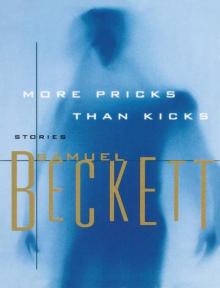 More Pricks Than Kicks
More Pricks Than Kicks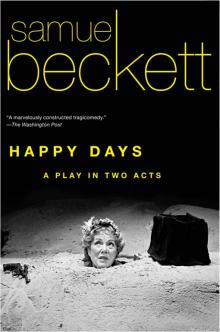 Happy Days
Happy Days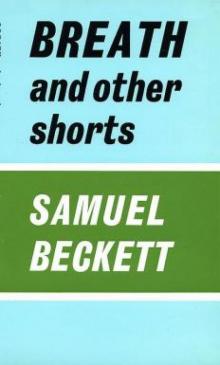 Breath, and Other Shorts
Breath, and Other Shorts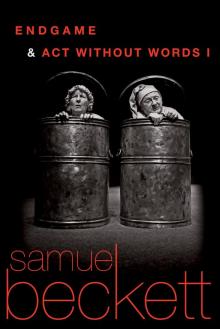 Endgame & Act Without Words
Endgame & Act Without Words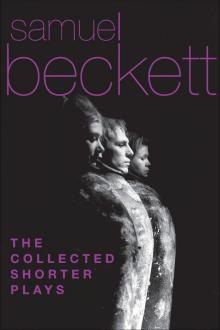 The Collected Shorter Plays of Samuel Beckett
The Collected Shorter Plays of Samuel Beckett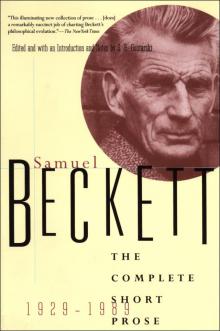 The Complete Short Prose, 1929-1989
The Complete Short Prose, 1929-1989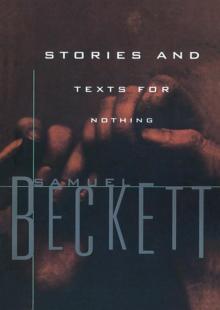 Stories and Texts for Nothing
Stories and Texts for Nothing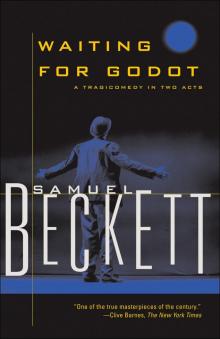 Waiting for Godot
Waiting for Godot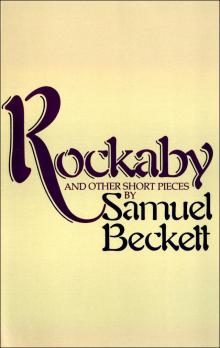 Rockaby and Other Short Pieces
Rockaby and Other Short Pieces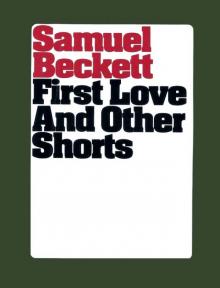 First Love and Other Shorts
First Love and Other Shorts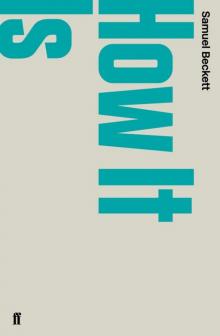 How It Is
How It Is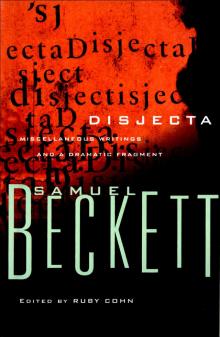 Disjecta: Miscellaneous Writings and a Dramatic Fragment
Disjecta: Miscellaneous Writings and a Dramatic Fragment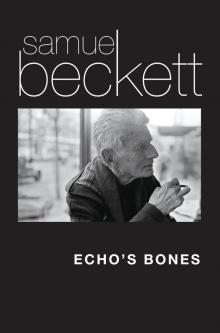 Echo's Bones
Echo's Bones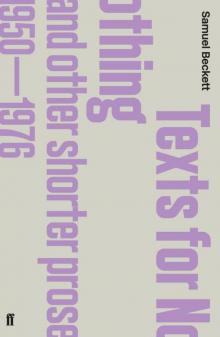 Texts for Nothing and Other Shorter Prose 1950-1976
Texts for Nothing and Other Shorter Prose 1950-1976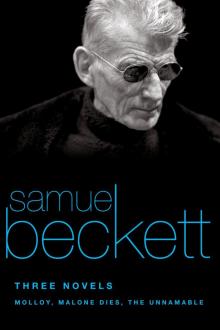 Three Novels
Three Novels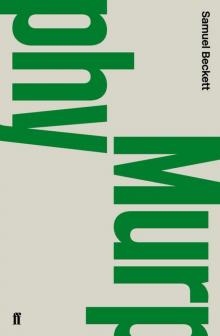 Murphy
Murphy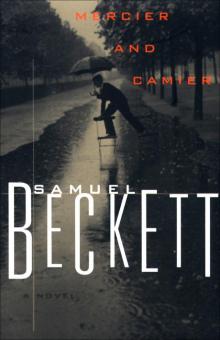 Mercier and Camier
Mercier and Camier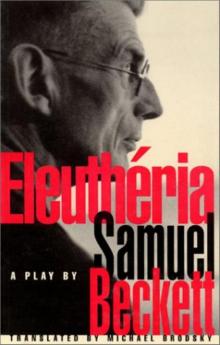 Eleuthéria
Eleuthéria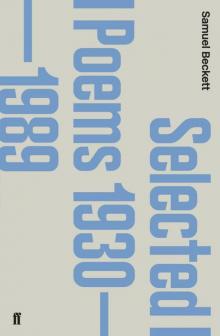 Selected Poems 1930-1988
Selected Poems 1930-1988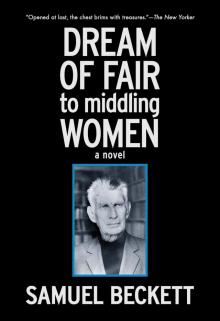 Dream of Fair to Middling Women
Dream of Fair to Middling Women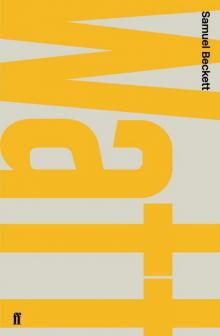 Watt
Watt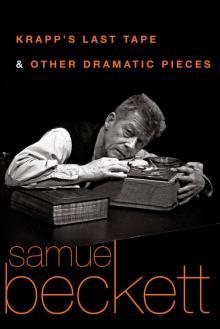 Krapp's Last Tape and Other Dramatic Pieces
Krapp's Last Tape and Other Dramatic Pieces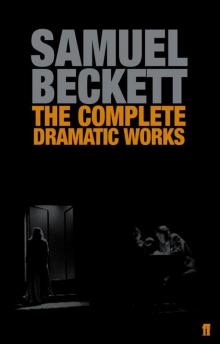 The Complete Dramatic Works of Samuel Beckett
The Complete Dramatic Works of Samuel Beckett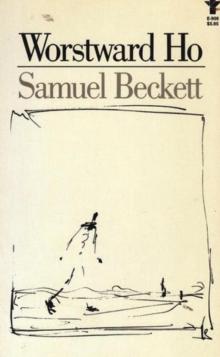 Worstward Ho
Worstward Ho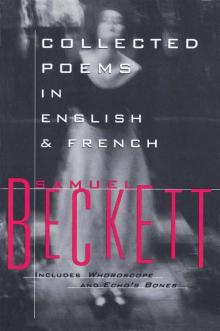 Collected Poems in English and French
Collected Poems in English and French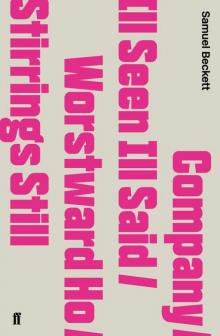 Company / Ill Seen Ill Said / Worstward Ho / Stirrings Still
Company / Ill Seen Ill Said / Worstward Ho / Stirrings Still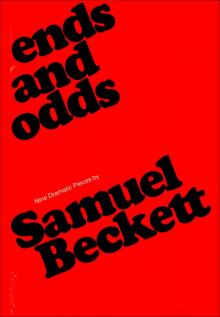 Ends and Odds
Ends and Odds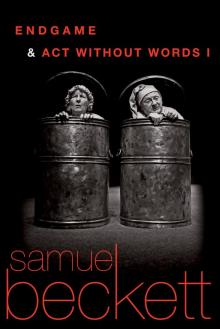 Endgame Act Without Words I
Endgame Act Without Words I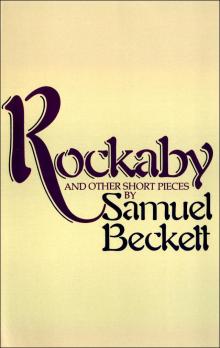 Rockabye and Other Short Pieces
Rockabye and Other Short Pieces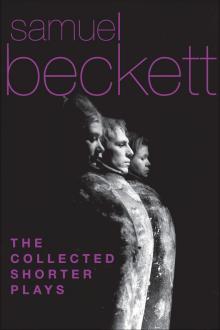 The Collected Shorter Plays
The Collected Shorter Plays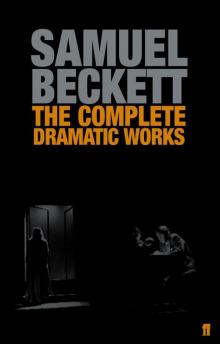 The Complete Dramatic Works
The Complete Dramatic Works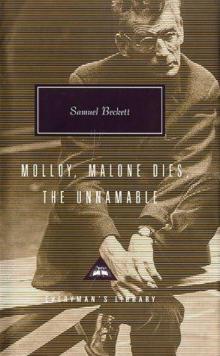 Three Novels: Malloy, Malone Dies, The Unnamable
Three Novels: Malloy, Malone Dies, The Unnamable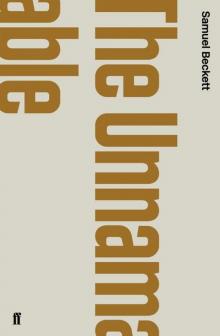 The Unnamable
The Unnamable